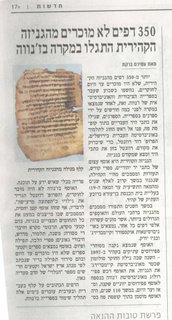Sexuality and the synagogue
Female sexuality is starting to become a topic that can be discussed frankly and maturely in Orthodox circles. Male sexuality, to judge by the latest rash of rabbinic scandals, still has a long way to go.
On Shabbat I came across a Geonic source with reflects, I think, a more open approach to sexuality in the social context. It is a responsum of Rav Hayya Gaon, quoted by Naftali Weider in his important early work on Islamic influences on Jewish liturgical practices. Weider shows that the custom of men refraining from prayer after experiencing seminal emissions, which is mentioned but branded irrelevant in Talmudic sources, came back into fashion in the later Geonic period. This resurgence of interest in matters of ritual purity was a conscious response to a similar Islamic practice.
In this context, Weider quotes Rav Hayya, who was asked whether a man who has become a ba'al keri on Shabbat should wash himself in cold water, even though this may endanger his health, or refrain from washing and hence, from prayer. Rav Hayya answers that it is quite acceptable for the man to refrain from prayer, and that such a concern is certainly not grounds enough to force him to endanger his health.
As support for his opinion, Rav Hayya tells that there were many Shabbatot when he participated in the prayers at the home of Rav Aharon Gaon (Sargado, I guess) and the Gaon would sit on the side and not pray. The implication, as Rav Hayya clearly understood it, was that the Gaon had ejaculated during the night, and he made no effort to hide this.
Besides the matter of heating water for washing, I suspect there is an additional reason this exchange focused specifically on Shabbat (and Yom Tov). There is a deeply rooted rabbinic custom to have marital relations on Friday night. This, in sharp opposition to sectarian groups (mostly Karaites, but also Jubilees, whoever that was, and others, like Samaritans). Some anecdotal 20th century sources on this were recently collected by Elliott Horowitz in his contribution to the BGU volume on Shabbat.
On Shabbat I came across a Geonic source with reflects, I think, a more open approach to sexuality in the social context. It is a responsum of Rav Hayya Gaon, quoted by Naftali Weider in his important early work on Islamic influences on Jewish liturgical practices. Weider shows that the custom of men refraining from prayer after experiencing seminal emissions, which is mentioned but branded irrelevant in Talmudic sources, came back into fashion in the later Geonic period. This resurgence of interest in matters of ritual purity was a conscious response to a similar Islamic practice.
In this context, Weider quotes Rav Hayya, who was asked whether a man who has become a ba'al keri on Shabbat should wash himself in cold water, even though this may endanger his health, or refrain from washing and hence, from prayer. Rav Hayya answers that it is quite acceptable for the man to refrain from prayer, and that such a concern is certainly not grounds enough to force him to endanger his health.
As support for his opinion, Rav Hayya tells that there were many Shabbatot when he participated in the prayers at the home of Rav Aharon Gaon (Sargado, I guess) and the Gaon would sit on the side and not pray. The implication, as Rav Hayya clearly understood it, was that the Gaon had ejaculated during the night, and he made no effort to hide this.
Besides the matter of heating water for washing, I suspect there is an additional reason this exchange focused specifically on Shabbat (and Yom Tov). There is a deeply rooted rabbinic custom to have marital relations on Friday night. This, in sharp opposition to sectarian groups (mostly Karaites, but also Jubilees, whoever that was, and others, like Samaritans). Some anecdotal 20th century sources on this were recently collected by Elliott Horowitz in his contribution to the BGU volume on Shabbat.
